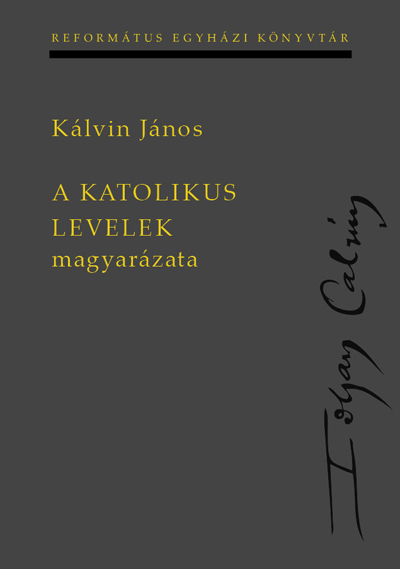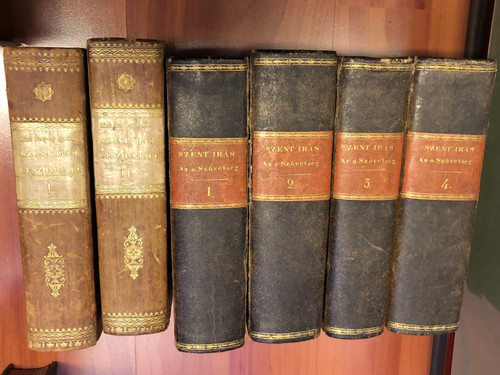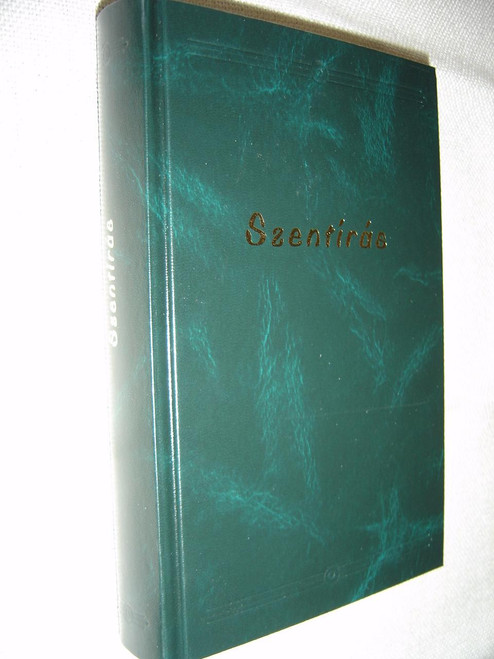Product Overview
A katolikus levelek magyarázata by John Calvin - HUNGARIAN TRANSLATION OF Commentaries on the Catholic Epistles / Calvin’s Commentaries are classics of the first order, essential reading for anyone studying a Bible text.
HARDCOVER 2013
ISBN: 9789635582365 / 978-9635582365
ISBN-10: 9635582366
PAGES 372
PUBLISHER: KÁLVIN
About the Author:
John Calvin (/ˈkælvɪn/;[1] French: Jean Calvin [ʒɑ̃ kalvɛ̃]; born Jehan Cauvin; 10 July 1509 – 27 May 1564) was a Frenchtheologian, pastor and reformer in Geneva during the Protestant Reformation. He was a principal figure in the development of the system of Christian theology later called Calvinism, aspects of which include the doctrines of predestination and of the absolute sovereignty of God in salvation of the human soul from death and eternal damnation, in which doctrines Calvin was influenced by and elaborated upon the Augustinian and other Christian traditions. Various Congregational, Reformed and Presbyterian churches, which look to Calvin as the chief expositor of their beliefs, have spread throughout the world.
Calvin was a tireless polemic and apologetic writer who generated much controversy. He also exchanged cordial and supportive letters with many reformers, including Philipp Melanchthon and Heinrich Bullinger. In addition to his seminal Institutes of the Christian Religion, Calvin wrote commentaries on most books of the Bible, confessional documents, and various other theological treatises.
Originally trained as a humanist lawyer, he broke from the Roman Catholic Church around 1530. After religious tensions erupted in widespread deadly violence against Protestant Christians in France, Calvin fled to Basel, Switzerland, where in 1536 he published the first edition of the Institutes. In that same year, Calvin was recruited by Frenchman William Farel to join the Reformation in Geneva, where he regularly preached sermons throughout the week; but the governing council of the city resisted the implementation of their ideas, and both men were expelled. At the invitation of Martin Bucer, Calvin proceeded to Strasbourg, where he became the minister of a church of French refugees. He continued to support the reform movement in Geneva, and in 1541 he was invited back to lead the church of the city.
Following his return, Calvin introduced new forms of church government and liturgy, despite opposition from several powerful families in the city who tried to curb his authority. During this period, Michael Servetus, a Spaniard regarded by both Roman Catholics and Protestants as having a heretical view of the Trinity, arrived in Geneva. He was denounced by Calvin and burned at the stake for heresy by the city council. Following an influx of supportive refugees and new elections to the city council, Calvin's opponents were forced out. Calvin spent his final years promoting the Reformation both in Geneva and throughout Europe.
Hungarian Summary:
Kálvin 1551 januárjában jelentette meg a kanonikus (vagy elterjedtebb elnevezéssel: katolikus) levelekhez írott kommentárjait. A magyarázatok közé nem vette fel János második és harmadik levelét, a kommentárokat pedig nem az általunk ismert kánoni rendben sorakoztatja egymás után. Annyit tudhatunk, hogy a Júdás leveléhez írott kommentárja eredetileg előadás lehetett (1540), a Jakab leveléhez írott magyarázatait pedig, melyeket a pénteki lelkésztalálkozón elhangzó magyarátokból állított össze, korábban önálló műként is megjelentette (1550).
Kálvin a VI. Edwardhoz írott ajánlásában részletesen szól korának egyik meghatározó fejleményről, a tridenti zsinat újbóli összehívásáról. A római katolikus egyház sorsfordító zsinatának első, 1549-ig tartó szakaszát Kálvin igen élénk figyelemmel követte, és folytonosan kommentálta. Ajánlólevelében azonban nemcsak arról értekezik, hogy az 1551. májusára újból összehívott zsinatnak milyen kimenetele várható az egyházpolitikában, sőt, leginkább az érdekli, hogy milyen kihatással lesz mindez az evangélium ügyére. (...) Kálvin ugyanakkor számos helyen, igen erős polémiával kitér korának rajongó mozgalmaira is, s ezt tennie is kellett, hiszen a kanonikus levelek némely passzusa folytonosan apokaliptikus spekulációk tárgya volt. S miután ezek a viták Kálvin egész életét végigkísérték, jegyzeteltük azokat a szakaszokat is, amelyekkel főművében, az Institutióban is foglalkozik, s így jobban kiviláglik, hogy az egzegézis és bibliai teológia milyen szoros összefüggésben állt Kálvinnál.
A kanonikus levelek esetében folytonos vita tárgya a szerzőség, olykor maga az autentikus szöveg is, illetve a tartalmi értékelés. Kálvin bátran vállakozik arra, hogy ezekben is állás foglaljon, hiszen a magyarázat során sem a szerző személyét, sem a körülményeket nem mellőzhetjük. Az olvasó itt is nyomon követheti Kálvin érett magyarázó módszerét: előbb a szöveg fordítása és közvetlen jelentésének kifejtése áll, ezt követi az értelmezés (...), és végül áll az összegzés. A saját célkitűzését pedig így summáza: „e levelekben számos homályos és rejtett értelmű dolog van, melyeket igyekeztem oly módon megmagyarázni, hogy a nem teljesen rest olvasó is könnyű bemenetet nyerjen a valódi értelemhez. Bogárdi Szabó István Előszavából
English Summary:
Calvin’s Commentaries are classics of the first order, essential reading for anyone studying a Bible text. Reading Calvin nearly always leads to new insights on a passage. Philip Schaff said of Calvin that he “was an exegetical genius of the first order. His commentaries are unsurpassed for originality, depth, perspicuity, soundness and permanent value. He combined in a very rare degree all the essential qualities of an exegete—grammatical knowledge, spiritual insight, acute perception, sound judgment, and practical tact.”








